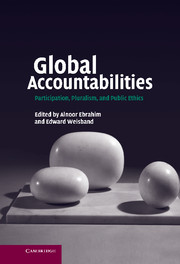Book contents
- Frontmatter
- Contents
- List of tables
- List of figures
- Acknowledgments
- List of contributors
- 1 Introduction: forging global accountabilities
- Part I Public accountability: participatory spheres from global to local
- Part II Experiments in forging NGO accountability: mutuality and context
- Part III Reflective accountability: new directions for participatory practices
- Part IV Global accountability frameworks and corporate social responsibility
- 11 Financial actors and instruments in the construction of global corporate social responsibility
- 12 Public accountability within transnational supply chains: a global agenda for empowering Southern workers?
- 13 Tripartite multilateralism: why corporate social responsibility is not accountability
- 14 Conclusion: prolegomena to a postmodern public ethics: images of accountability in global frames
- Index
- References
11 - Financial actors and instruments in the construction of global corporate social responsibility
Published online by Cambridge University Press: 22 September 2009
- Frontmatter
- Contents
- List of tables
- List of figures
- Acknowledgments
- List of contributors
- 1 Introduction: forging global accountabilities
- Part I Public accountability: participatory spheres from global to local
- Part II Experiments in forging NGO accountability: mutuality and context
- Part III Reflective accountability: new directions for participatory practices
- Part IV Global accountability frameworks and corporate social responsibility
- 11 Financial actors and instruments in the construction of global corporate social responsibility
- 12 Public accountability within transnational supply chains: a global agenda for empowering Southern workers?
- 13 Tripartite multilateralism: why corporate social responsibility is not accountability
- 14 Conclusion: prolegomena to a postmodern public ethics: images of accountability in global frames
- Index
- References
Summary
Introduction
A great deal of attention has been paid in recent years to the increasing role and power of multinational corporations (MNCs) and the apparent lack of accountability they have to the international community at large. There has been a tremendous growth in the numbers of these large companies and an acknowledgment of their critical importance to the global economy (Koenig-Archibugi, 2004). In terms of influence, one familiar argument is that such firms are criticized for the power they have over economic policies: states compete with each other to attract foreign investment capital, the so-called “race to the bottom” thesis in which legal and regulatory standards are purportedly compromised in this competition. A related and increasingly common line of criticism is that the advent of global capitalism has not been matched by the development of governance mechanisms that can adequately oversee if not restrain the excesses of its primary agents, i.e. transnationally active firms. Indeed, holding such corporations accountable for actions (or inactions) that harm (or are perceived to harm) society has become a focal action point.
Many people thus believe that the central nexus in the debate over the future of capitalism itself surrounds the extent to which corporate interests can and should be made more accountable, if not subservient, to broader societal interests.
- Type
- Chapter
- Information
- Global AccountabilitiesParticipation, Pluralism, and Public Ethics, pp. 227 - 251Publisher: Cambridge University PressPrint publication year: 2007
References
- 2
- Cited by

